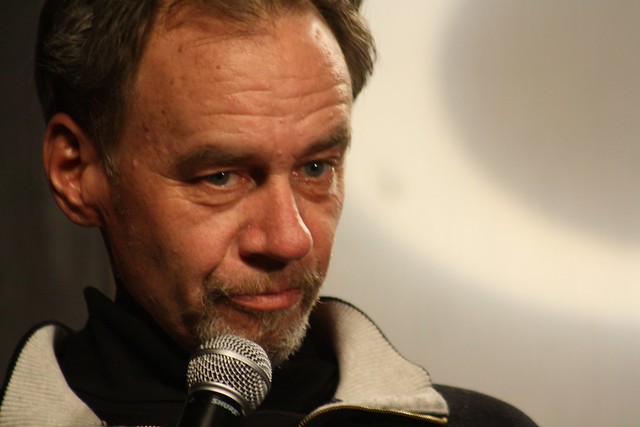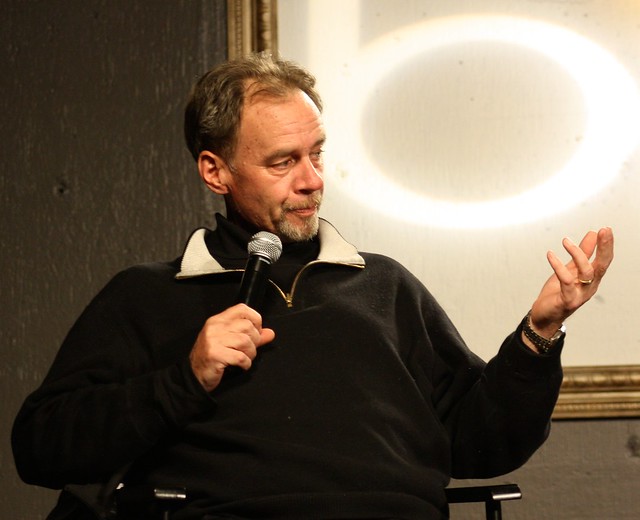

By Ray Pride Pride@moviecitynews.com
David Carr Talks Times And “Going Toward Things”
THE AFTERNOON AFTER THE SUNDANCE 2011 PREMIERE OF Page One: A Year Inside the New York Times—where post-screening Tweeters were well-impressed that New York Times reporter David Carr was greeted at the Q&A afterwards with a “rock-star standing ovation”—director Andrew Rossi and Carr talked about media at a casual Bing Bar panel moderated by Anne Thompson of indieWIRE’s Thompson on Hollywood. (Halfway through, Thompson announced the film had been bought for summer release through Magnolia and Participant.)
“We all have more tools than any newsroom when I first walked into one. That guy in the front row,” Carr says, “he’s posting, he’s shooting video, he’s probably recording, he’s tweeting, he’s doing God knows what.” But if you’re producing content, he says, “You don’t have time to consume any of it. The more you write, the stupider you get.” Still, his advice for young writers who want to advance is a simple trio of questions: “What can you make? What can you build? Again and again?”, using those tools.
Anticipating the spring launch of the Times paywall, he jokes that the paper is saying, “‘Hey, how about giving us some sugar, since we see you coming around?’ We’re going to try and preserve our visibility on the web but create another source of revenue.”
Thompson asks about aggregators that don’t offer link-backs or that go beyond fair use, after she wonders if Michael Wolff‘s Newser is “the enemy.” Carr says, “We don’t have much to worry about because Newser seems to be tanking.” (Appreciative, if nervous laughter all around.) “The killer app on the web is, and always has been news,” he continues. “You can’t just put some topspin on what someone else said and expect to make a living. We have 1,100 people in the newsroom. It’s very expensive, but it can be very lucrative as well.”
Carr and Wolff had a conversation at Sundance 2010. “Michael said, I’m not a business reporter, and I said, ‘Yeah, it’s manifest in what you wrote.'” As for electronic-vs.-print as a way to produce income, Carr says, “We’re going to get a look with Rupert Murdoch‘s iPad newspaper, The Daily. But for legacy businesses like us, we put white paper on the street and we bring green paper back in. That’s our job.” He cites Politico.com putting a paper on the streets of D.C. and the seemingly unlikely merger that is the NewsBeast. Still, Carr thinks the different way the iPad is perceived will seduce news consumers away from the idea that information on the internet should be free.
There’s a question from the audience about WikiLeaks and the Times. “Yesterday, apparently, WikiLeaks said on Twitter that the New York Times is in the service of the government.” A pause. “Let’s say the relationship is evolving.” WikiLeaks, he thinks, needs its old media partners not just to disseminate, but also to contextualize its revelations. “It gets so much more bounce when it’s edited and backgrounded.”
Of the documentary itself, “There’s stuff in there we don’t like,” Carr says, bluntly, drawing laughs with his timing, saying that a lot of the figures on the screen are “these hambone white guys, we’re unhappy to have their every move looked at.” Rossi notes that there were fourteen reporters on the media desk when he began shooting; two were women, and both declined to participate.”
Carr estimates he has 290,000 Twitter followers, but if he weren’t a Timesman, he’d likely have only 290. “I have this nice, personal brand, but the fact that it’s stapled to this huge megaphone is what makes it important.”
He was in New Jersey on 9/11 and told his wife he was in the wrong state, he should be in New York. “Dude, everybody’s leaving the city. You’re not going to get in, you shouldn’t come in. The one thing that is sort of true even of people like me, and I don’t do the most mission-critical job at the New York Times, by a long shot. But the impulse is to go toward things, that’s what we do. We go toward things.”















